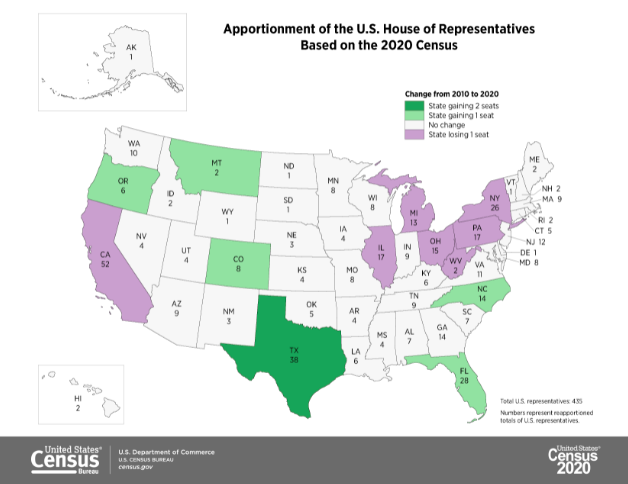As the Census Bureau released initial numbers of the 2020 census, experts and advocacy groups have begun to express concern that communities of color, particularly Latino and Asian communities, have been undercounted. This would mean that for the next decade, states with large Latino populations may receive less federal resources like funds for infrastructure, schools, and other public works—all of which are determined by census data.
The Census Bureau released state population totals last month, which are used to determine each state’s number of representatives in the House. Only seven seats moved among 13 states, but experts worry it is in these states that minorities were undercounted. “The total resident population number was at the lower end of the estimates, and several states with large Latino populations did not do as well. And unfortunately, that, to me, suggests too many coincidences,” said CEO of the National Association of Latino Elected and Appointed Officials Arturo Vargas. For example, Arizona, Texas, and Florida, states with significant Latino populations, each got one less House seat than was projected. Arizona was particularly surprising, given that the state’s population grew by more than 766,000 since the last census. California and New York, where large Latino communities also reside, both lost a seat.

Although the released apportionment numbers are raw head counts without detailed data on the racial or ethnic makeup of each state, advocates are expressing concern over the quality and completeness of the data because of the unique challenges of last year’s census. A truncated timeline, a global pandemic and President Trump’s unsuccessful attempt to include a citizenship question in the form—and the legal battles surrounding it—all likely impacted the accuracy of the headcount. Additionally, the bureau has acknowledged that historically, minority groups tend to be undercounted because of barriers like language, internet access, or living in rural areas. Civil rights organizations like the NAACP have sent a memo to President Biden asking that the administration carefully mine federal data to make sure communities of color are not undercounted or excluded from access to resources, especially as the country recovers economically from the pandemic.
The Census Bureau, however, is urging that people be patient as more data is released. “It is too early to speculate on undercounts for any specific demographic group,” Karen Battle, Chief of the Census Bureau’s population division, said in a statement. She added that the redistricting data that will be released in August will “contain the first information on race and ethnicity” in greater detail. Tom Wolf of the Brennan Center for Justice at the New York University School of Law also pointed out that we still do not know much about the racial and ethnic characteristics of the census. “But even if they were completely accurate, there would still be a need to keep a careful eye open for problems of racial and ethnic differential undercounts going forward,” he added.
